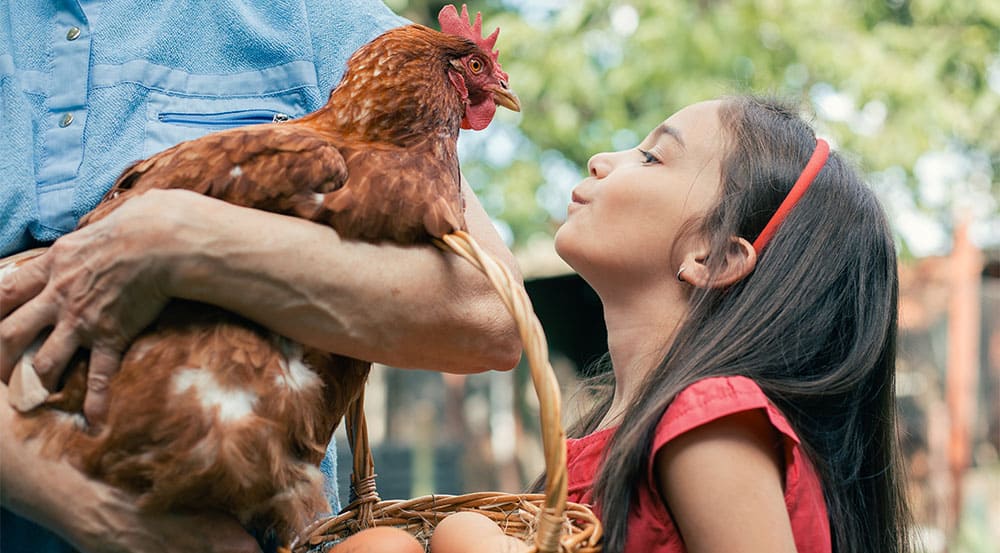Is there anything more bucolic, more redolent of the good life, than a few plump chickens roaming your lawn? Thousands of Australians would say there isn’t, which is why feathered companions have soared in popularity in recent months. Once the territory of hippie homesteaders, backyard chickens have now well and truly entered the mainstream.
And no wonder. Chickens will gobble up your kitchen scraps, turn them into the best eggs you’ve ever tasted, and produce rich garden fertiliser while they’re at it. Feed them a handful of weeds a day to turn their yolks a deep rich orange, and let them at the compost heap — it’ll be aerated within minutes. Treated well, your hens will also make great family pets and can be delightful companions for young and old alike.
If you want to join the chicken craze, here’s what you should know about keeping your backyard beauties in comfort.
How many should I keep?
Chickens are flock animals. They get lonely and depressed if made to live on their own. Three is considered the minimum to allow them to form healthy relationships and establish a proper pecking order.
The upper limit will depend on how much space and time you have available. While chickens are very low maintenance animals, they do still require some upkeep. The more chickens in your coop, the more frequently you’ll have to clean it.
Consider how many eggs you need. Are you hoping for just enough for your family, or will you be selling some to friends and family? As a rough guide, three hens will provide you with about two eggs per day (although this is breed and age dependent). You can scale up from there.
Chickens need space to forage in. If you’re not intending to let yours out to free range, animal welfare organisations suggest an allowance of 2sqm per hen. While you’ll read some advice that suggests a more modest 4square feet (0.37sqm) per bird, this is not ideal for full-time confinement. The more space your chickens have, the happier and healthier they will be, with a lower risk of the pecking behaviours that come with overcrowding.
Where should I keep them?
Chickens need an enclosure which is:
• Fox-proof — chickens taste as good to predators as they do to humans, and they have very few natural defences. Make sure your coop can be secured when they’re tucked up on their roost at night, and remember that foxes are diggers!
• Partially shaded — chickens shouldn’t be exposed to full sunlight all day, especially in warmer months, as the heat stress can kill them. If they’re free-range, make sure you have trees and bushes for them to nap under. For chickens confined to a run, consider a solid roof or positioning their home under trees for summer shade.
• Accessible to humans — you’ll need to collect their eggs and be able to clean out the enclosure as chicken poo builds up.
Chicken tractors are a great option for a small flock: they’re designed to be moved around your garden, so the hens can pick one patch of grass clean of bugs and worms, leave their deposits of fertiliser behind them, and then be moved onto greener pastures.
What should I feed them?
Commercial chicken feeds are plentiful on the market. If your hens are laying, make sure you buy a layer mix — these have added calcium which helps them form strong eggshells.
You can supplement that diet with a wide range of kitchen scraps. That’s part of the magic of backyard chickens: they take the food you don’t want and turn it into delicious eggs and garden fertiliser! Chickens will eat almost anything from fruit and vegetable scraps to seeds, grains and dairy. They’ll also gobble up cooked pasta, rice and bread, but limit these, as they’re essentially ‘junk food’ for birds.
How do I find them?
Produce and fodder stores often carry chickens for sale. Usually these will be the commercial breeds, like Isa Browns and Hylines. These are friendly, docile birds that make good family companions. If you want heritage breeds, do an internet search to see if there are chicken enthusiast groups in your area. Country areas often host poultry shows, where various breeders can showcase their flocks and offer a variety of breeds for sale.
Each breed has its pros and cons, and they vary wildly in size, temperament and the types of egg they lay. Make sure you understand the breed you’re buying so you don’t get any nasty surprises.
What age should I be looking for?
If you’re buying hens for eggs, look for birds labelled as POL. This stands for Point of Lay, and means that the bird is a young female who is about to start laying. Hens are at their most productive in their first year and their egg-laying frequency diminishes as they age.
Pullets are typically 8-14 week-olds. Pullets are young female chickens: old enough to be sexed so you don’t end up with an unwanted rooster, but young enough that you’ll have to wait a bit longer for eggs. Pullets don’t need heat and can go in a standard coop, although if you already have fully grown hens you might need to separate them until the youngsters can hold their own.
You can also buy day-old chicks if you want to try your luck at hand-rearing them. These fluffy little cuties can be irresistible, but will need a ‘nursery’ coop and a heat lamp for several weeks. You can’t sex day-olds with any reliability, either, so you’ll need a plan for any that develop into roosters.
Chickens are an immensely rewarding hobby and will give you great pleasure. Treat them well and enjoy those delicious homegrown omelettes!
